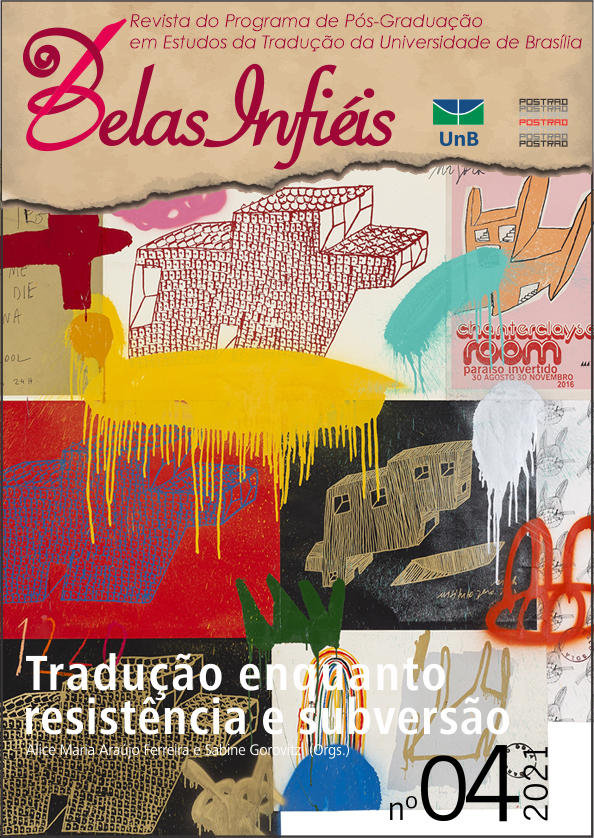Narratives of Terrorism and Security: ‘Accurate’ Translations, Suspicious Frames
DOI:
https://doi.org/10.26512/belasinfieis.v10.n4.2021.30322Keywords:
Translation. Narrative. Arab. Muslim. MEMRI.Abstract
Constructing and disseminating ‘knowledge’ about a number of communities and regions widely designated as a security threat is now a big industry. Much of this industry relies heavily on various forms of translation and, in some cases, is generated by a team of dedicated translators working on full-blown, heavily funded programmes that involve selecting, translating and distributing various types of text that emanate from Arab and Muslim countries: newspaper articles, film clips, transcripts of television shows, selected excerpts from educational material, sermons delivered in mosques. Drawing on narrative theory and using examples from institutions involved in constructing this type of knowledge, this article argues that attempts to discredit such efforts by questioning the ‘accuracy’ of individual translations miss the point. What is needed, instead, is a more nuanced understanding of the subtle devices used to generate dehumanising narratives of Arabs and Muslims through carefully planned and generously funded programmes of translation.
Downloads
References
Baker, M. (2005). Targamat al-sardiyyaat/Sardiyyaat al-targama (Tradução de narrativas e narrativas de tradução) (H. Azmy, Trad.). Fossoul, 66(3), 21–34.
Baker, M. (2006). Translation and conflict: a narrative account. Routledge.
Baker, M. (2007). Reframing conflict in translation. Social Semiotics, 17(2), 151–169.
Baker, M. (2008). Ethics of renarration: Mona Baker is interviewed by Andrew Chesterman. Cultus, 1(1), 10–33.
Baker, M. (2009). Resisting state terror: theorizing communities of activist translators and interpreters. In E. E. Bielsa & C. W. Hughes (Orgs.), Globalization, political violence and translation (pp. 222–242). Palgrave Macmillan.
Bennett, W. L., & Edelman, M. (1985). Toward a new political narrative. Journal of communication, 35(4), 156–171.
Fairclough, N. (2001). Language & power. Pearson Education. (Obra original publicada em 1989)
Fairclough, N. (1995). Critical discourse analysis. Longman.
Friedman, T. (2005, 22 de julho). Giving the hatemongers no place to hide. The New York Times. http://www.nytimes.com/2005/07/22/opinion/22friedman.html
Friedman, T. (2006, 22 de fevereiro). Empty pockets, angry minds. The New York Times. http://select.nytimes.com/2006/02/22/opinion/22friedman.html?_r=1
Gentzler, E. (2002). Translation, poststructuralism and power. In M. Tymoczko & E. Gentzler (Orgs.), Translation and power (pp. 195–218). University of Massachusetts Press.
Harris, L. (2003, 15 de janeiro). A note on MEMRI & translations. Counterpunch. http://www.counterpunch.org/harris01152003.html
Hijazi Al-Sharif, S. (2009). Translation in the service of advocacy: narrating Palestine and Palestinian women in translations by the Middle East Media Research Institute (MEMRI) [Tese de Doutorado, Universidade de Manchester].
Huntington, S. (1996). The clash of civilizations and the remaking of world order. Touchstone.
Livingstone, K. (2005). Why the Mayor of London will maintain dialogues with all of London’s faiths and communities: a reply to the dossier against the Mayor’s meeting with Dr. Yusuf al-Qaradawi. Greater London Authority.
Moore, K., Mason, P., & Lewis, J. (2008). Images of Islam in the UK: the representation of British Muslims in the national print news media 2000–2008. http://www.cardiff.ac.uk/jomec/resources/08channel4-dispatches.pdf
Norouzi, A. (2007). ‘Wiped off the map’ – the rumor of the century. http://www.antiwar.com/orig/norouzi.php?articleid=11025
Packer, G. (2007, 26 de março). Betrayed: the Iraqis who trusted America the most. The New Yorker. http://www.newyorker.com/reporring/2007/03/26/070326fa_fact_packer
Pappe, I. (2009). De-terrorising the Palestinian national struggle: the roadmap to peace. Critical Studies on Terrorism, 2(2), 127–146.
Philo, G., & Berry, M. (2004). Bad news from Israel. Pluto Press.
Shamma, T. (2005). The exotic dimension of foreignizing strategies: Burton’s translation of the Arabian Nights. The Translator, 11(1), 51–67.
Shamma, T. (2009). Translation and the manipulation of difference: Arabic literature in nineteenth century England. St. Jerome Publishing.
Steele, J. (2006, 14 de junho). Lost in translation. The Guardian. http://www.guardian.co.uk/commentisfree/2006/jun/14/post155
Toury, G. (1995). Descriptive translation studies and beyond. John Benjamins.
Tymoczko, M. (2000). Translation and political engagement: activism, social change and the role of translation in geopolitical shifts. The Translator, 6(1), 23–47.
Venuti, L. (1993). Translation as cultural politics: regimes of domestication in English. In M. Baker (Org.), Critical readings in translation studies (pp. 65–79). Routledge.
Venuti, L. (1995). The translator’s invisibility. Routledge.
Whitaker, B. (2002, 12 de agosto). Selective MEMRI. The Guardian. http://www.guardian.co.uk/elsewhere/journalist/story/0,7792,773258,00.html
Whitaker, B. (2007, 15 de maio). Arabic under fire. A child on Hamas TV talked of annihilating the Jews… or did she? The Guardian. http://www.guardian.co.uk/commentisfree/2007/may/15/arabicunderfire
Downloads
Published
How to Cite
Issue
Section
License
Copyright (c) 2021 CC BY

This work is licensed under a Creative Commons Attribution 4.0 International License.
Given the public access to this journal, the texts are free to use but requires the recognition of the original authorship and initial publication in this journal to be properly stated.
 The journal allows the use of works published for non-commercial purposes, including the right to submit the work to publicly accessible databases. Published contributions are the sole and exclusive responsibility of the author(s).Â



















